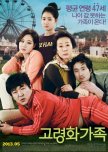
Dysfunctional family to touch. True to life. Rough. Surprisingly on a positive note though
"Boomerang Family" refers to the term 'boomerang kids': adults who for pragmatic reasons move back in with their parents - mostly for financial reasons, because of unemployment or because of divorce. The protagonists of this KMovie are the mother, her three adult children and her granddaughter. Together they form the boomerang family.In South Korea, family is the greatest good. Family is omnipresent and gets involved everywhere. This does not mean, however, that family is therefore only associated with happiness, love and warmth. On the contrary. There's a lot of pain associated with it. Much is and remains unsaid. Punches are often included as well.
That's what "Boomerang Family" is about - the dysfunctional aspects of a simple family. Strife and rivalry and fights. Envy and inferiority. Pride. Yet also moments of happiness. Eventually not being seen. Yet, being seen, too. Unspoken truths that will sooner or later be told anyway. Very private, often rough, unsightly, even downright repulsive manners in everyday interactions in the smallest of spaces, which we actually (if at all) only share in the closest, most intimate circle. E.g. in family, that takes you as you are. (Inevitably.) (Out of habit.) (Because one is just so familiar due to the proximity in time and space that one has shared.) (Out of love?)
The bottom line in "Boomerang Family" is love, which, in its most screwed up way, slumbers and lurks somewhere behind the curtain of mostly ugly, all too familiar patterns of everyday, long-established, well-established manners. Strangely enough, it is simply there.
In the world of the protagonists that curtain is rather shabby. Life is simple. The language rough. Proximity is created through shouting, scrambles and fights. Community can be experienced through shared meals, though. Those meals structure family life and become a connecting, binding medium. The common meal is the place of communication and encounter under largely regulated, peaceful conditions. Everything before and after, however, can quickly (almost certainly) get out of hand.
A special aspect for South Korean conditions, where the direct bloodline is still enormously important: Over time, it becomes clear that the protagonist family is actually a rather progressive variant of a patchwork family. Because of that fact, at first glance all seems to be in question. Nevertheless, this realization cannot erase the lived experience as a "family". The simple, unnamed, tangible, rustic, crude 'love' between siblings that is celebrated with this movie, is not in the genes, but has grown out of shared experiences. In this message lies the magic of this otherwise rather brittle, sometimes dark story. Eventually the heaviness is balanced here and there with a breeze of quite idiosyncratic humor.
Everyone in the family has their own stories and small, medium or big tragedies that bring them back together under one roof. A dysfunctional family to touch, true to life, authentic, in all obscenity. As a spectator, you are brought up close, sometimes closer than you might like. Heaviness and pessimism may want to impose themselves in the course of events, but they ultimately fail to determine the emotional space. You wouldn´t believe it, but the story ends on a consistently positive note.
The KMovie is a film adaptation of a novel. It could also be a theatrical performance. It touches, repels, shamelessly places the ugly next to moments of happiness. Who actually is to judge life? What is good? What is beautiful? What is valuable? What is happiness? Ultimately, all protagonists feel (not only, but ALSO) valuable and happy in their affiliation. So what are the criteria for evaluating the quality of life? "Boomerang Familie" chooses a very idiosyncratic, but ultimately soothing perspective - beyond lifestyle, image, aesthetics or monetary wealth.
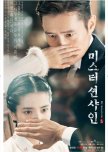
This KDrama is more like an epic movie that (fortunately) doesn't want to end over 24 episodes
"Mr. Sunshine" is pure epic! Visually stunning! Heartbreaking. With a fantastic cast! In addition, there is a vivid and at the same time gripping history lesson (dealing with the turn of the 19th / 20th centuriy). The KDrama is more like an epic movie that (fortunately) doesn't want to end over 24 episodes. Complex characters, interwoven developments with sudden twists, cinematic camera, unforgettable soundtrack, everything seems handpicked, nothing off the shelf. The budget was correspondingly high, but it isn't just good because it was expensive. Rather, it is made with a lot of love from front to back and down to the last detail. There are hardly familiar motifs that we have often seen in variation. Everything is precisely coordinated in all scale levels. The personal decisions that the protagonists make over and over again in the course of the story remain unpredictable until the end.Historically we learn about the relationship between Joseon and the Japanese, but also with the rest of the world. The story takes place before the country becomes a Japanese protectorate - in that brief window of time when Joseon (after a long period of isolation) became the Greater Korean Empire and then opened up to the rest of the world. For this reason, the USA also play a role in here, because the States - like Russia and Japan - are ready and waiting to get involved in the imperialist competition for the largest slices of the cake Joseon is offering. The country is rich in raw materials and therefore hot property. "Mr Sunshine" provides a vivid and gripping introduction to those geopolitical complications.
------------------ SIDE NOTE --- Historic setting: Joseon and the rest of the world ...
Since the 17th century, Joseon rather had itself isolated from the outside world. This rigorous attitude ultimately led to the first military confrontation between Joseon and the USA, which marks the kick off point to the plot of "Mr. Sunshine". In 1866, an American ship, the SS Sherman, entered Korean waters via the Taedong River. Since it did not turn around immediately when asked, there were violent arguments in which the ship was ultimately set on fire. This was followed in 1871 by the battle off the island of Ganghwa-do, in which the USA wanted to rescue the survivors of the shipwrecked crew and at the same time establish the first prerequisites for trade relations. However, since the desired diplomatic gesture of the Korean apology did not happen to take place, the Joseon garrison on the island was radically wiped out by the American warships and their crew. This first conflict with the USA went down in history as 'Shinmiyangyo'.
King Gojong came to the throne in 1873 and, in contrary to previous national policy, decided to open up his country in the hope of flourishing trade and technical innovation. Japan pushed ahead and forced the Japanese-Korean friendship treaty of 1876 on the king, including military pressure, too. However, this was a contract between unequal friends... In the course of the international processes that had been initiated, King Gojong also sought contact and trade agreements with Western countries.
---------------------------------------------
During this time, "Mr. Sunshine" stages its main plot, in which protagonist Eugene, as US officer of loathed Korean descent, is supposed to sensitively, competently and diplomatically represent the interests of the USA with a consular mandate. But there is always more life has to offer... Eugene has to meet the love of his life, face his roots and reconsider his values in life. He can´t help it: he has to take a stand...
It is said that not everything is historically 100 percent precise, but the historical circumstances provide plenty of material for pure epic drama at its finest. Thrilling. Unforgettable.
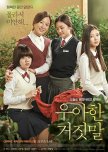
Fantastic, the (red) thread - in every respect.
I have been reading only positive critiques about “Thread of Lies” all over the place. It just took a while before I could see the KMovie for myself. Basically, all the praise has already been said. Nonetheless! The story, which is sad in itself, is told, staged and acted in just such a wonderfully clever way! Despite the seriousness of its topic, the basic attitude is positive and light. The complex and complicated underlying social and emotional mechanisms are so sensitively identified and processed, I can't help but find words of praise for "Thread of Lies" myself, too! Absolutely worth seeing! The characters, their motives and backgrounds, their conflicting feelings, the gray in the shadow, the light in the darkness, everything comes across as multidimensional authenticity.The older sister sets out to find out the actual reasons for the suicide of her younger, 14-year-old sister. We with her. There are traces – Suspicion. Culprit. Fault. Shame. As far as the eye can see... ...including the look in the mirror. Yet, it is not the index finger being raised. Rather, there is a hand, valiantly reaching out. Powerful!
It is not about accusation and blame or justification and defense. It is like it is. It was what it was. Recognizing THAT for what it is. Not sugarcoating it. No excuses. Recognizing each individual’s own contribution to some tragedy. It's all about this. To learn something out of it? In the best case!
In this KDrama, bullying (or mobbing) comes without bloody beatings and physical violence. Rather, it is the psychological, manipulative, nastily hidden, difficult-to-understand social-emotional mechanisms that are elaborated in an extremely sensitive, comprehensible way. A girl is forced into inner isolation at an age when the peer group actually becomes more important than family. Friendship, dependence, abuse - the boundaries are not yet so clear. When it comes to that, the young are still 'children' – perhaps with high ideals already, but still without lived friendship-experience. Friendship is a word with deep meaning, a powerful concept. It is related to high hopes and yearnings. It is needed, in order to survive in this world.
In contrast, there are parents who know better and still duck away. There are bullying victims who somehow survived. Also parents, who are absorbed in their own world. And in the middle of it all, a young girl says goodbye to this world. Decided and definite. Yet at the same time hesitant, too. Desperate after all. Helpless. A 14-year-old says goodbye to a world in which the only one, who knew about how she truly felt, was a stranger...
The complex story is processed in a non-linear manner. Compact and yet differentiated. The tragedy of the unspectacular is intensified by a rather subtly developed arc suspension. Touching, but not told in an overly emotional way. And what can I say... the story unfolds in such a true to life manner that you can't even be angry with the venomous perpetrator. At least not as much as you would like...
Fantastic, the (red) thread - in every respect.
PS:
The story is based on the novel “Elegant Lies” by Kim Ryeo-ryeong in 2009. Actually, the film production had a rather low budget and its initial difficulties to get started, as the topic is considered highly sensitive, especially in South Korea. The KMovie, however, gave the lie to the doubters. The response was enormous and consistently positive.

Father + daughter challenged in the face of presenile Alzheimer
Cassiopeia has already won the Korean Association of Film Critics Awards 2022.I would recommend it, too.
The KMovie Cassiopeia tackles an unpleasent subject: presenile Alzheimer's dementia. In an increasingly aging society, dementia will become more and more present and more common within the personal environment of all of us. Most cases occur at ages 65+. However, a small percentage is also affected at a younger age. This can even occur very early due to hereditary factors - as documented sensitively and unforgettable in the KMovie "A Moment to Remember". But this can also have many other causes. Dementia is a shocking diagnosis at any age, because with your eyes wide open, your own life inevitably slips away... faster than you imagine, you will no longer be able to recognize your own children, partners, friends or parents, while also the bodily functions will do their own thing.
"Cassiopeia" is about a woman in her 40s who is overwhelmed by presenile Alzheimer's dementia. However, the narration is slightly different than in "A Moment to Remember". "A Moment to Remember" captures the strong emotionality of the mental degeneration process practically from within - in touching scenes and sensitive relationship dynamics and tells the story of how memories in her head are erased as a painful loss for everyone involved. In "Cassiopeia", on the other hand, the audience follows the accumulating social moments in a comparatively objective manner, in which the exponentially progressing decay of the nerve cells is expressed - simply stating, so to speak. (Just as the protagonist initially presents herself as an objective, sober and rather sever person.) Emotionality is not dramaturgically staged in this KMovie, but results from the sum of soberly observed situations of individual loss of control and Su-jin's familiar world broken in two - one in which clarity still reigns and one in which everyone, even she herself is a stranger. From the emotionality thus involved - fear of failure, helplessness, shame, being at the mercy of others and much more - one cannot withdraw oneself. Rather, this emotionality develops an increasingly peculiar driving force (just as the protagonist's psychological/physical development process picks up speed). Eventually, the KMovie goes straight to the heart and makes people think.
In "A Moment to Remember" the focus was on the relationship dynamics with the beloved husband, here it is the portrait between daughter and father. In this case, the father tries to do better in old age what he could not do when he was younger, as he was not around.
In "A Moment to Remember" the protagonist is still at the very beginning of her young, promising life. In "Cassiopeia" Su-jin has achieved quite a lot: she is a mother, a successful lawyer, and also divorced. The daughter is about to move to her father in the USA. Significantly, the life of the protagonist, as it was up to now, ends in several respects with the departure of her daughter. It becomes difficult even for the star constellation Cassiopeia to give life perspective and orientation...
(By the way: the KMovie builds on a nice analogy between Cassiopeia and family. Both the star constellation pointing to the North Star and one's own family cannot help you, finding your path and your own way with life. Yet, we can rely on them if we got lost along the way: as some place to look out for/reach out for, regarding perspective/support).
Emotive. Especially by those often deliberatly soberly, calmly captured situations in which both the orderly and deformed worlds meet and finally merge. The helplessness and coldness of the social environment enfolds in all its unvarnished harshness - by its objective narrative style and camera perspective it is subtly thrown back at us. We are emotionally drawn into what is happening in two respects: regarding our empathy with Su-jin, which we cannot escape in the progress of the story, as well as regarding our identification with people/strangers Su-jin meets along the way - because that is what we are, too. How do WE actually deal with people who have obviously lost control of their lives or are about to lose it? Can WE stand this? Can WE lend a helping hand with this? Be of support? Even (or especially) if it's just a casual encounter on the street, an acquaintance in the neighborhood, or a colleague at work?

Radiant indeed! Honest. Real. Powerful. Intense. Soulful. As is the life of the Haenyeo.
Remarkable. Exceptional. A Shining Star in KMovieHeaven."Everglow" is radiant indeed. Honest. Real. Powerful. Told in few words only, but with wonderful pictures and profound scenes with soulful encounters. Full of love for the island, the Haenyeo, the sea, the landscape, life and love - in whatever form it chooses to show itself.
Go Doo-shim has surpassed herself many times in her long career as an actress and has set an unforgettable monument to many a female archetype. But in this life-affirming chamber piece that breathes pure nature, she surpasses herself a bit more: in the role of one of the comparatively few remaining, unique Haenyeo divers on Yejudo's coasts: Grumpy, dismissive, plain, robust, simple, strong, tireless, helpful, sensitive, profound, motherly, grandmotherly, friendly, old wise woman as well as tender, vulnerable, radiantly in love. With a great pain and a big heart - but she keeps both hidden deep inside of her. "Life makes life go on." Deeply connected and yet alone. Al(l)One with everything, while diving in the sea.
------------------------------------------------------------
The Haenyeo...
...are at home in the silence of the sea. Every day for up to 7 hours, in and under water, while holding their breath for more than 3 minutes. Breaking the surface, in stages they loudly blow out the air they are holding, while breathing in fresh oxygen, too. "Sumbisori" is the name of the peculiar whistling sound, for which each haenyeo finds its own variation. When they have deposited their prey in the net and their breathing has returned to normal, they launch again and dive back down into stillness. This is a world unto itself. Mentally focused on the now. Physically hardened by sun, wind and salt water. Depending on the time of year, tide and weather, several hours in the sea are followed by long breaks in order to warm up by the fire, together with the other haenyeo. Haeneyo is what women do. Haenyeo shapes the women of the island, makes them self-confident, independent and firmly connected in matriarchal community. After warming up, it's back into the water for several hours. It is an intense, existential, essential life in total surrender to the sea.
"Everglow" honors the life and tradition of the sea women or daughters of the sea in two respects, in that the story of the story has just such a monument and legacy as its subject: A documentary about the Haenyeo, which is to be broadcast on television.
Girl power and Haenyeo go hand in hand on Jejudo. Life on the island follows different rules and rhythms than on the mainland. Diving for valuable seafood of all kinds off the coasts of the volcanic island has traditionally been a woman's job. A lucrative one at that. The seabed is like extended farmland. The Haenyeo and its contribution to the cultural life on the island is undisputed and has even been included in the UNESCO list of intangible world heritage sites since 2016. Since 2017, the Haenyeo have also been officially recognized as an intangible cultural asset of South Korea. A culture that is dying out. Hardly any of the professional divers today are under 50, most are over 60. The technical equipment is almost the same as at the beginning of their career, which begins for most at about 8 years - with plenty of swimming and diving training in shallow water. From about 15 they are then considered "Baby Haenyeos". Experience and training are everything, because it's about nothing less than daily survival using enormous lung capacity, robust physicality for high resistance to the cold and a lot of practice in equalizing pressure. Once you are a daughter of the sea, you rarely get away from it. There is no retirement age. After bathing suits became neoprene suits, the time in the water between breaks could be significantly increased. Some swim out from shore, others take boats, and still others engage in some form of island hopping. Each has their sea farm, which they reap almost daily.
And each has a tremendous knowledge of nature, the sea, the wind and the tides. The women always work in community, take breaks in community and support each other in community. Haenyeo are environmentally conscious marine experts from the very beginning and pioneers of an emancipated life. (Significantly, Jin Ok is given the suffix or title 'Uncle' - as the eldest of her group, she is both a person of respect and, as the binding matriarchal head of the community, equal to any man who would otherwise hold this position in Confucian tradition.)
----------------- SIDE NOTE: --- Uprising 1948/49 ---
Since "Everglow" deals with the simple life of the now mostly old Haenyeos on Jejudo, the memories of the 72-year-old protagonist inevitably also touches on a lesser-known event in recent history that shook the island deeply: an uprising against an anti-communist government campaign. Between April 1948 and May 1949, the resistance cost around 30,000 people (about 10 percent of Jejudo's residents) their lives.
--------------------------------------------------------
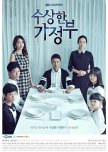
Profound, idiosyncratic mixture of different genres, coherently combined to form a new whole
The story is surprisingly exciting and complex, with an inscrutable main character and her mysterious past. Basically it's a thriller. At the same time, however, the story also offers plenty of food for thought and/or empathy about modern educational concepts. In any case, the story falls outside the scope of the usual KDrama stuff. On the side, one also gains some impressions of life in the middle class, of the difficulties of single parents (although men have it a bit better than women), of bullying at schools or of abusive parents-in-law.A central storyline revolves around the now: the employment of Park Bok-nyeo in a family with a single father and 4 children who are dealing with their traumatic recent past - the suicide of the mother/wife. The second central plot line works in the background and deals with Bok-Nyeo's own traumatizing past, which shapes her behavior to this day. It is inevitable that both strands eventually become entangled.
Choi Ji-woo marvelously represents the housekeeper Park Bok-neyo. She fulfills her tasks calmly, patiently and disciplined. Always clearly demarcated without ever pulling a face (in 20 episodes)! (Ok, maybe once...) However she can hide well behind her role as a housekeeper and like that escape her own inner emptiness, as she herself is emotionally broken and limited in her ability to relate. Her own traumatic past is now catching up with her and threatens to turn her current life upside down again. But she is older by now, more mature and thus she tries to face her fate emotionally strengthened and resolutely and prepared to get over it to some extent. In the process eventually she offers a variety of psychologically and pedagogically valuable interventions in the everyday life of all family members. It's not all cliché, but offers touching, funny and very serious moments.
So this is not a love story. "Suspicious Housekeeper" offers an idiosyncratic mixture of different genres that are coherently combined to form a new whole with a surprisingly profound entertainment value. All actors, up to the 4 kids, contribute to the living impression of the overall work of art.

The abundance of (epic) tragedy is KDrama at its finest - meanwhile the Joseon empire is born
"My Country - The New Age" is set in the historical transition period between the Goryeo era and the Joseon era. The context is General Yi Song-gye, who for the next approximately 5 centuries tied the throne to his bloodline with a coup d'etat. However, this KDrama isn´t a history lesson as such, though historical figures get involved. Also romance is not the predominant matter. ... First and foremost it's about loyalty, unconditional male friendship and love as its basis. Secondly, it is about relationships between fathers and sons. Thirdly it is about romantic love, too. Besides and as a backbone for the storyline´s dramatic dynamics it its about political attitudes, visionary leaders and the throne. Overall, "My Country - The New Age" is definitely worth seeing, yet you should be prepared for makjang-like emotional roller coasters.The actors significantly contribute to the intensity of the story. Above all, the charisma of Jang Hyuk as Lee Bang-won (the 5th son of General Yi and later 1st Joseon King), as well as Ahn Nae-sang as the fictional Nam Jeon, whose political stances are reminiscent of the historical Jong Do-jeon (the historical Jong Do-jeon and chief chancellor, who set the political, administrative and legal course for the newly blossoming Joseon Empire.)
----------------- SIDE NOTE: --- Lee Bang-won (later King Taejong) and Jong Do-jeon (first chief chancellor of the Joseon aera) ---
These two crucial historical personalities (Lee Bang-won and Jong Do-jeon) were both driving forces in those early years of the new empire with quite lasting impact, and at their time fundamental adversaries.
Jong Do-jeon as the first Joseon King´s chief chancellor decided all matters relating to military affairs, diplomatic procedures, questions of education, new legislation and constitution (the once feudal state was now organized in a bureaucratic manner), new tax laws as well as new state religion (Buddhism became Confucianism). He ultimately moved the capital to Hanyang (now Seoul). He also named the districts of Hanyang and the 8 provinces in the country and caused many slaves to be freed. He was a man with strong visions for an innovative political system in the new kingdom - and consequently implemented those (quite unscrupulously).
His opponent was Yi Bang-won, who did not want an empire with ministers being more important than the king. Rather, he prefered a powerful monarch, a solidly grounded monarchy. He was also one of those who had contributed most to his father's successful coup d´etat. However, the latter had finally disappointed him by not choosing him as his successor. After the Queen's death, Bang-won took advantage of his father's period of mourning and invaded the palace. In doing so, he killed the state chancellor, all ministers loyal to him and the children of the deceased queen as well as the crown prince, too. So he (also) took the throne by force - his father could only abdicate and reluctantly hand over the crown. However, as King Taejong, Bang-won effectively contributed to a stable system of government in his own way. Among other things, he enacted a law allowing all citizens to register and established new Ministries: of Human Resources, Finance, Protocol, Defence, Justice and Public Affairs.
----------------------------------------------------------
With Jang Hyuk as Lee Bang-won and Ahn Nae-sang as the fictional Nam Jeon, who to a certain extent represents the ideas of Jong Do-jeon, the KDrama paints a strong picture of the crucial conflict between those political visions from the very beginning. The actors live their roles with high intensity. We get to know more about their character in their respective relationships with the two protagonists Seo Hwi, son of a once-legendary soldier of the Goryeo Empire, and Nam Sun-ho, the illegitimate son by Minister Nam Joen. Since childhood they are best friends. Then there is a twist of fate. (Here, again: two actors with splendid performance - Yang Se-jong and Woo Do-hwan.) Minister Nam Jeon alone is responsible for the twist of fate in this friendship, but Prince Bang-won becomes a free rider in this.
In short: "My Country: The New Age" offers an epic, visually stunning story with a lot of action and emotion, worth seeing sword fights (actor Jang Hyuk does the stunts all by himself), plenty of blood and even more emotion. Yes, of course there are also women and love involved ... The abundance of (epic) tragedy is KDrama at its finest.
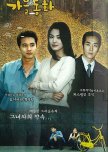
Makyang at its finest. Staged with great sensitivity. A rollercoaster ride of emotions guaranteed!
Back then, in 2000, "Autumn Tale" kicked off the celebrated "Endless Love Series" and is (like the other 3) a hit. Timeless. Heartbreaking in the face of life's unfairness. Bittersweet and tragic. "Autumn Tale" offers makjang at its finest. All of this is staged with great sensitivity. A rollercoaster ride of emotions guaranteed!Two siblings who aren't actually siblings - but nobody knows. A momentous decision when it comes out randomly. Outrageously mean intrigues. And an unshakable bond of love that (nevertheless) must not be. Because even if you might dare to rebel against the family, there is always another stroke of fate.
It is always possible for things to turn out worse - this is a promise, KDrama Land can surely give!"Autumn Tale" is prove of that. And as always with makjang: an enormous capacity for sympathy, suffering and compassion is a prerequisite for 'enjoying' this KDrama. Makjang could be considered a reinvention and revival of the idea of catharsis in connection with the Greek tragedy. On the roller coaster of human feelings between greed, love, betrayal, hate and forgiveness and suffering, scolding, laughing, crying, the moment of empathizing with the emotional processes of the protagonists can have a liberating effect. (All 4 KDramas of the "Endless Love Series" - "Winter Sonata", "Summer Scent" and "Spring Waltz", too - are actually great at ´that´. You better be prepared and ready for it... if you are, you won´t be disappointed!

It is about the area of tension between longing, choices in life, accountability and responsibility.
"A Man and a Woman" is emotionally profound, yet subtly leading into intimate depths where it hurts, too. There are no pink ribbons. And the intimate encounter of two souls does not miraculously sort out the problems of the world in a groundbreaking way. Life is difficult. There are also unexpected beautiful moments. But life remains difficult. Is that why it's bad? Only bad? "A Man and a Woman" paints a portrait of two people who have careers of their choice and families - but life is still no lollipop. It is about having an affair. It is about wanting another life. It is about the area of tension between longing, choices in life, accountability and responsibility.Highly valuable.

Not your usual RomCom, yet a love triangle on top of a socially critical labour dispute mission
The protagonist's name "Byeon Hyeok" means "revolution". The wordy title "Revolutionary Love" already hints that this is about a Romance. But this title also contains the second plot line: the love that leads him to revolution - to resistance and struggle for the rights of irregular workers in the company of a powerful Jaebeol. One way or another, Byeon Hyeok is at the center of events - as the eldest son of Jaebeol of the Gangsu Group, who is in love and choses the barricades (and new ways) within the corporate culture of his father's business group.Basically, the topic of such a labor dispute is rather socially critical and highly explosive, because there is practically no legal representation for the irregular part-time workers in South Korea. The number of non-regular employees is four times higher than among the other OECD member states. Employment relationship is not well protected. There is no union representation. Irregular employees usually only receive about half the wages of a permanent employee. The time limit is barely a year. Since the Asian crisis, this form of employment has proven to be cost-saving and convenient for small and large companies, so that it has been retained on a large scale to this day. "Revolutionary Love" cleverly focuses on this aspect of the South Korean working world as this critical topic is sort of camouflaged with a lot of slapstick and speed on the humorous note ... and of course there is the romance...
The role of Byeon Hyeok is a showpiece for Choi Si-won, who, with his wide array of physical, wordless visual grimaces and gestures, softens the actually frustrating labour dimension by Korean standards to a level that makes it accessible to the masses on public cable TV (and 'permissible' for the powerful). At the same time, Choi Si-won has the necessary sincerity to also show his sensitive side and create space for the closeness of a romantic relationship. In contrast to the comedic character of Byeon Hyeok is his 'friend' Kwon Jae-hoon, whose leitmotif ´seriousness´ can hardly be surpassed. In between, the head of the "revolution" whirls: the street smart Baek Joon.
"Revolutionary Love" is a KDrama that is often underestimated by Western viewers in its ambitious socio-critical and labour policy claims. It knows how to touch with the protagonists' love triangle despite the labour dispute mission. Yet, be aware, it is not your usual RomCom.

Psychological thriller re. gaslighting & family, wonderfully wrapped in the cloak of a black comedy
Psychological thriller meets black comedy. “Bittersweet Hell” is wonderfully staged in many ways. The script may have its weaknesses here and there, but the performance as a whole quickly makes you forget about that. Lee Hye-young clearly steals the show from Kim Hee-sun here. However, it's hard to top her fantastic performance as the eccentric mother-in-law (which alone might make a rewatch worthwhile...). Together they form a resolved mother-mission-duo, both determined to fight the 'WE' of their family, in which they feel deeply at home… even if this 'WE' might have plenty of flaws... Eventually, the cast is also hand-picked in other ways, e.g. with KPop Idols Yeonwoo, Jaechan and Chansung. Overall, I´d say “Bittersweet Hell” offers unique KDrama enjoyment.The plot is centered around the psychological phenomenon of so-called 'invalidating communication', which is also known as 'gaslighting' – after the play "Gas Light", which became particularly famous in the 1944 film adaptation "The House of Lady Alquist" with Ingrid Bergman. Gaslighting is about deliberately and consistently misleading a partner, family member or close friend. Gaslighting only works among close ones, i.e. trustworthy people. Thus manipulated with psychological tricks and lies, the victims feel increasingly insecure when it comes to their own perception, ultimately preferring to entirely rely on the supposedly valid judgment of their trusted person… who is now able, to fully control his/her victim. In "Bittersweet Hell" various examples of this phenomenon add to the plot dynamics. In passing, the KDrama also explores other socially explosive topics – above all the high value and ideal of ´family´ versus the sobering reality of ´actual family lives´, but also the weal and woe of the mother's role, different parenting styles and sexual orientation.
In my opinion, "Bittersweet Hell" could have used the 16 episodes (there are only 12) in order to better develop some character profiles. The effective production and performance, however, is actually very well making up for some lack of substance here and there. Therefore I´d consider this criticism a suffering on a rather high level… because nevertheless, “Bittersweet Hell” comes along as a great psychological thriller about gaslighting and family, wonderfully wrapped in the cloak of a black comedy.
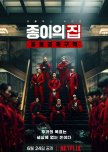
Korea´s socio-political North-South dynamics suspensefully catapulted into mass consciousness
"Money Heist: Korea - Joint Economic Area" is a remake of the Spanish Netflix production "La casa de papel". As with "Designated Survivor: 60 Days", "Suits" or "The Good Wife", this South Korean remake also sticks closely to the original. Many viewers may work through what is better, whether it is necessary, etc. - Not me, though. Rather, what fascinates me is how specifically Korean socio-political dynamics have been woven into the present story and suspensefully catapulted into a global consciousness.Against this background, the series is truly brilliant. Most viewers might probably miss this or could care less, and thus don't even pay attention to it. Nevertheless, this or that might eventually fall in places, unconsciously. Be as it may be...
"Money Heist: Korea - Joint Economic Area" takes place in a fictional economically united Korea. This premise as a setting alone is ingeniously visionary, because it conveys into the mass consciousness such a not sooo unrealistic agreement scenario for the stuck situation between the two countries: An economic union that could be profitable and attractive for all sides... Yet, immediately the potential stumbling blocks are swimming in the wake... Exploitation, fraud, abuse! The promise of freedom and unlimited opportunity turns out to be just more profit and opportunities for those who are already living in the fast lane. The promising scenario for peace and prosperity for everybody might be one side of the coin, a raised index finger is pointing to the other side already: Attention! Wiheom! Danger!
"Money Heist: Korea - Joint Economic Area" is provoking with a dramaturgical "Hello-Wake-Up!" - On the one hand these potential capitalist dynamics could make a promising peace scenario possible, but on the other hand, in the same breath, would also torpedo it. This is where the big plan of the 'professor' comes in. He wants to counteract the machinations of the powerful, who are busy filling their already full pockets, regardless of those, who pay the price. Thus he comes up with a spectacle that will shake up the public (and their decision-makers). In the end this might ultimately force the system to be more mindful and aware in approaching a true joint venture in order to make it work for the people (not only the CEOs and the powerful).
In this context, the characteristic difficulties between Koreans from North and South are successfully demonstrated again and again: the deep distrust that has been actively cultivated for so long. The fear that the war, which has officially not ended yet, will openly continue. The constant spying. The contempt for the other system. All of this was politically tirelessly staged for more than half a century. Families were being torn apart almost at random back then (1950s) - like in Germany after the Second World War. At a time X, some were on one side of the boundary line and others were on the other. Coincidence. Fate. What followed after that was propaganda, both here and there. Building up an enemy image. And what was done back then, even if the framework conditions for rapprochement might been created, has to heal over time first. (This can be learned by the experience in Germany: having reunited for more than three decades, still in society the 'wall' between ´Ossis´ and ´Wessis´ has not yet been truly overcome...)
"Money Heist: Korea - Joint Economic Area" succeeds in weaving a realistic future scenario for a united Korea into an exciting story. With all difficulties and opportunities. In this respect I consider this KDrama a strong production. In doing so, the KDrama brings this possibility of a Korean peace closer into the mass consciousness - first of all for the South Korean society, which is extremely sensitive to this topic, but ultimately also for the rest of the world.
I also have criticism.
This is neither concerning the story nor the actors, on the contrary. And it is not about the fact that connoisseurs of "La casa de papel" will be strongly reminded of the original (including the names of the characters). No. I rather have a more general complaint regarding many Korean Netflix productions (vs. the national KDrama TV productions).
-First, there is the spice up of the narrative style for an international (rather male) eye that is generally used to a good portion of sex & crime and a higher pacing. Well, I don´t need it.
-Second: Why not really telling the story to the end? Yes, it could be "worth" one or more seasons, but nevertheless. They even split the first season into part 1 and 2. I don´t like it.
-Third: The sensitive emotional momentum, that is so crucial for KDramas, is reduced to the max. Yet, the strength of a KDrama, in my experience, is that we are emotionally drawn inside, that we identify ourselves, feel empathetic, and get very close to the protagonists, get involved into their world. International Style on the other hand is rather characterized by keeping a critical distance. Here the audience is watching from the outside. The story and acting may grab you, but you stay outside and watch. You don't necessarily get emotionally involved. What is happening will be and will remain the story of others. In this particular case as well. So unfortunately once again a central KDrama unique selling point was abandoned for the standards of international Netflix world. This is not necessarily bad, yet different. I would say the experience of watching is less intense compared to other KDramas.
Luckily, the KDrama in general has more than one crucial strength and can instead show off some of those others. So does "Money Heist: Korea - Joint Economic Area"...
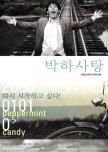
Not nice to watch but definitely worth seeing. Superbly done in many ways. Powerful. Resonating.
Prolog:The conclusion for the protagonist in his late 30s is rather tragic: he´s getting the urge to go back. He wants the life of his late youth back. He cannot continue with who he is today. For him, there is only one option remaining – a shortcut to the exit.
However, for the audience, the end is actually the beginning. The journey goes backwards in seven chapters. And when we finally reach the start, it actually makes sense to look at the ending again... (in movie-terms: its beginning...)
-------------------------------------------------- ----
“Peppermint Candy” was one of the top ten movies in 2000. The international awards it collected are respectable. And even in 2022, “The Guardian” has it listed in 12th place among South Korean film classics. Meaning: It was topical back then and still hasn’t lost its impact. It´s cult. It can be considered particularly valuable. However, it´s not particularly nice, though. Rather particularly powerful and ferociously intense.
"Peppermint Candy" dates from 1999. It tells the story of the previous two decades of South Korean history using the example of an arbitrary, inconspicuous individual. For audience who isn´t firm in recent South Korean history, the KMovie may be reduced to the protagonist as an individual - to his very personal story and his tragic ending. For all those who know something about the historical, social background (see the side note below if you like), the KMovie becomes a memorial on screen that commemorates all those in society who were probably thus affected in one way or another, too, and may have had a similar experience. And there were quite a few.
In 1999, South Korea looked back on two extremely eventful decades. Two decades that were endured, sustained, borne by the people... Two decades that, in addition to democracy, turbo-capitalism and material prosperity, also produced a whole series of psychological cripples.
I actually don't like the word 'cripple', but somehow it seems appropriate in this case, here in the sense of: people who were maltreated by others or 'by life´s circumstances' to the point of psychic unconsciousness (even if perhaps they themselves were involved as perpetrators, too). People who were broken by their fate and trauma, not being allowed to and/or able to talk about it. People who fell, lost themselves, could no longer get back on their feet, feeling helpless. Completely bent. People who could not find peace with their shame and guilt. In their inability to communicate about it and get help, they became a total human failure for those around them.
In reverse "Peppermint Candy" portrays the career of such a psychological (and physical) 'cripple' in intense scenes. We may acknowledge the individual fate. Even without historical background and regardless of socialization, we acknowledge a broken soul, of which all that is left to the outside world is actually an 'asshole'. Once a poetic, delicate, sensitive spirit... it´s hard to believe. Actor Sol Kyung-gu expands the entire range of his skills, convincingly and uncompromisingly drawing the audience into each of his divers crucial, rather unpleasant emotional life situations.
“Peppermint Candy” is superbly done in many ways. Not too much, not too little. Ruthless. And in pointed, symbolic imagery, the scenes gain in emotional power and meaningfulness as they progress - even after we have travelled a few sequences further (back) - to the extent that the puzzle of drastic life events accumulated are coherently put together into a pile of shards.
The protagonist in "Peppermint Candy" is experiencing the significant historic events of his generation at the forefront. His psychical downward spiral cannot be stopped. But this protagonist is no exception. Countless people in their late thirties in South Korea in 1999 could have told such or similar stories. During those traumatizing two decades the public was carelessly left alone to individually deal with what had happened. What a person experienced emotionally, what a person had to process and couldn't, the decisions made, the guilt, the shame, the pain – the answer to that was mainly psychological repression and silence about it. The consequences in everyday life: Outbursts of acting up and/or apathy. Sometimes the old wound hurts again. The old wound makes man fall to the ground, by its pain that he cannot escape. But it is also a phantom pain - the desperate suffering over an essential piece of 'who I am' that was taken away once and for all...
The protagonist in "Peppermint Candy" suffers on behalf of an entire generation of anonymous young people who were quietly worn down, deeply psychologically shattered and finally by the two decades of the 80s and 90s, the time of transition from military dictatorship to modern capitalism existentially bankrupt. The KMovie reaches out to all those who may have had a similar experience and/or were able to sympathize. Where communication had been lacking for decades, the KMovie, with its sometimes disturbing insights, tries to build a bridge: with understanding that may even extend to empathy. "Peppermint Candy" manages to connect the South Korean people through the fate of this one fictional man and his personal environment. (Additionally, it may even touch the rest of the world). Yongho, who could be 'anyone', and with him the women in his life, his friends (?), his colleagues and his victims who had crossed his path, who could also be 'anyone'…
Not nice to watch. But definitely worth seeing.
Powerful. Resonating. A convincingly empathetic work.
A work of passion.
--------------------------------------------------------------------------------
SIDE NOTE: --- Brief overview of the historical background of South Korea - regarding May 1980 in Gwangju, the 1980s under repressive police violence, and the years of economic miracle up to the Asian crisis of 1997-1999. ---
May 1980 in Gwangju, South Korea, featured a bloody massacre that the police and military were ordered to carry out on their own people. Yet, that massacre of Gwangju remained an official taboo for almost two decades. What happened in Gwangju back then was kept secret from the rest of the country. Then, the city was deliberately cordoned off. The enemy was officially called 'communism' (especially in student circles, supposedly under the infiltrated influence of North Korea.)
Those who survived May 1980 in Gwangju and perhaps could or would have wanted to talk about it were pressured, persecuted, tortured and put in camps. The others who preferred to remain silent had to figure out by themselves how to emotionally digest what had happend.
President Chun Do-hwan, who succeeded his predecessor Park Chung-hee in the aftermath of the bloody spring of 1980, did not create any less autocratic structures for the common people than before with his dictatorship. On the contrary. With him, brutal torture was carried out in the spirit of a systematic cleansing. The years of Chun Do-hwan's rule were some of the worst for South Korea in terms of political repression. His mission: The country should use all its might to present itself to the rest of the world as dazzling and up-and-coming until the Olympic Games. Whatever/whoever was bothersome was put away. However, the autocratic rule of the dictator and his brutal power apparatus with police and secret service ended in 1987 as a result of unbridled, enormous public pressure. The people's longing for democracy was finally able to prevail.
Parallel to the repression under Chun Do-hwan, the 1980s and following years were characterized by the years of economic miracle. The market became increasingly liberalized and it was all about exports. Yet, on a large scale growth and prosperity were built on credit: direct investments from abroad, credit cards for the people in the country, loan sharks for all those smaller companies that couldn't get the money from the banks. But the bubble of the expansive credit economy of the 1990s burst in 1997 with the Asian crisis. The credit boom was followed by a crash, an enormous fall in the value of the won, a series of bankruptcies, unemployment all over the place and poverty for the many.
Even though South Korea got back on its feet astonishingly quickly in the course of the subsequent years of the so called IMF Economic Crisis, the path was marked by countless fates of bankruptcies and many families suffering from for a long time since.
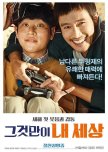
Disillusioned life scenario, yet spiked with moments as the ego steps aside + heartopening happens
A wonderful movie in many ways.This KMovie is aiming straight at the heart. This is already indicated in the international title "Keys to the Heart". Also, that the piano plays a key role - i. e. its 88 white and black keys.
The original title is more like "This only is my world" and refers in its own way to the piano, because this is the world of the autistic protagonist Jin-tae. However, this also refers to the (also limited) world of his brother Jo-ha, to which Jin-tae starts belonging. Additionally, revolving around Jin-tae (and Jo-ha) is their mother. "Keys to the Heart" is a story about that mother and her two very different sons. She left one of them decades ago as a little boy under dramatic circumstances and to date he hasn't forgotten, let alone forgiven. The other is autistic with savant syndrome.
It´s a given that the story intends to bring tears to your eyes. Yes. The story wants to get to the heart. But not generally in a tender, comforting and blissful manner. In fact, there is nothing but pain drifting around those hearts in this story. The framework of the plot draws a disillusioned, depressed scenario of the lives of ALL characters - regardless of whether they are rich or penniless, or otherwise have a more or less comfortable living. (The exception to the rule here is the autistic Jin-tae.) As if it were the most natural thing in South Korean everyday life for people to suffer. There is a good deal of social criticism in this KMovie. I think that's often overlooked in its critics or reviews.
There's the drinking, beating father; the abandoned son; the penniless son who can do nothing but box; the brutal world of dog fighting, where boxers beat each other bloody for money; the single mother with cancer; the mother with guilt; the autistic son; the depressed, suicidal, rich, once famous invalid; the Jaebeol CEO, whose money doesn't help her to be able to buy back her daughter's happiness. Eventually "Key to the Heart" is a dreary, sobering contemporary document. Not a picture of society of the crisis-ridden 1990s, no. It is a simple, unpretentious social inventory of the South Korean affluent society from the year 2018...
Now, some heart-warming light is shining into this fundamentally gloomy everyday world. (And in those of the audience as well.) In rather small spots though. These are brief details, inconspicuous moments (apart from the big spotlight of the finale, which is a bit more spectacular). However, those little spots make all the difference. Not a flash of inspiration, rather a flash of the heart, in which the injured ego steps aside for a moment: for a moment of clarity for the essential: actually, what´s NOW. For a moment, people can just let go of all grief and become open to what life has to offer just NOW: beauty, warmth, joy, hope. This NOW can transform, heal, completely change the view of the world. The world on this earth itself is the same, yes, the planet does not change its orbit because of it. It's not suddenly 'everything will be fine again'. And yet it is something like 'everything-IS-good'. ... That brings us to the KMovie's favorite quote: "Impossible is not a fact. It's an opinion." (Muhammad Ali)
Admittedly, a button is pressed when it comes to the piano music. The classics take their space. But here, too, the story does not fail to take the opportunity to point out the ego-driven business with it - the talent and passion of the musicians may be on the one hand, but the very personal interests of teachers and directors are on the other...
Of course, with Jin-tae as a young man with an autism spectrum disorder with savant syndrome, the KMovie is deliberately pressing another selected button, with the intention of moving hearts. Nevertheless, even this developmental disorder is not romanticized, yet shown as demanding and exhausting to deal with.
Particularly pithy and powerful: The contrast between the world of the buttoned-up, reserved, respectable, reasonable and properly dressed classical music scene and the childlike, impulsive and playful but brilliant Jin-tae, whose piano playing tears down walls for a moment.
At last, we are back at the beginning: a story about that mother and her two very different sons... There is hurt, sorrow, the pain of loss and guilt - all is there, what life has to offer to become estranged from each another, or to feel lonely and abandoned. And that's where love - no matter how screwed up - finds its screwed-up moments. I don't think predictability is a problem with this movie, because it doesn't want to be 'enthralling'. Yet, it wants to touch the heart, and it does. Eventually, that's good for everyone. With this movie, it is the HOW that is decisive: by sober narration of a basically rather depressing story that thrives on short, unspectacular moments (and the actors) in which 'new' NOW-decisions are made and heart opening becomes possible.
Great!
--------------------------- SIDE NOTES --- Savant syndrome ---
Savant syndrome has often been a topic in the cinema, for example in the US production "Rain Man". There are only around 100 "Savants" known worldwide (from the French 'savoir' = knowing, how to do it). Accordingly, the phenomenon has only been scientifically examined to a limited extent. In the musical field, there are various examples of Savants (like the fictitious Jin-tae here in the movie) who, without any music lessons, are able to play the most difficult pieces of music with accentuated detail after just hearing it once - solely thanks to their perfect hearing.
However, Savant syndrome usually goes hand in hand with autism spectrum disorders. This in turn refers to developmental disorders of varying severity. The people affected typically have little interest and competence when it comes to social interaction. They prefer to live in their own world. Generally, their perception is strongly focused on details and does not weight them like the otherwise socialized majority around them. Details that others usually overlook become subjectively crucial, while information considered essential to their environment may not play any particular role at all. Information is initially unfiltered, being of equal value in its perception. Thus, without the social-cognitive filters that non-autistic people learn to develop, the moment of sensory overload followed by stress is quickly reached.
--------------------------------------------------------------------------------------
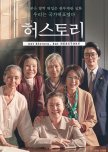
It is not a fun movie, yet it is radiating truly positive energy in spite of its appalling topic
"Herstory" is an example of a highbrow KMovie, which has real life as its subject and at the same time influences real life as an impact of the movie reception.It is about the lawsuit brought by a handful of "Comfort Women" from Busan - actual long forgotten/ignored sex slaves for the Japanese soldiers during the Second World War. The trial took place between 1992 and 1998 in Japan. This noteworthy trial set in motion the resolution of a rather dark chapter in recent Asian history.
It was about time to not look away anymore. The subject of "Comfort Women" was until then a taboo subject even in South Korea. The refered to court hearing in the 1990s was actually a milestone in the reappraisal of this chapter. Thus the KMovie "Herstory" is a poignant, publicly effective monument to this chapter in history and honoring the affected, victimized and long forgotten women (and their advocats).
"Herstory" is sensitively illustrating the painful path to this (no less painful) trial as well as its dramatic individual cases. The KMovie becomes the mouthpiecer of at least a few of those women´s fates and at the same time a touching memorial, arousing the awareness of the cruel war crimes committed against civilian women.
It is not a fun movie, yet it is radiating a tuely positive energy in spite of its appalling topic! I consider it in several respects highly valuable.
It is about empowerment and sisterhood. The cast ist outstanding.
This movie is confronting glorious ´his´stories with ´his´ rather tabooed ignominious behaviours... and thus make it ´her´stories.
---------------- SIDE NOTE --- Historical Comfort Women in World War II ---
For a long time, the fate of an estimated 200.000 Korean young women and girls, who were traumatized as sex slaves by the Japanese military during World War II, went unnoticed by the world. Until the 1990s their existence was a taboo - even in South Korea! In fact, Japan's government and military recruited (mostly) Korean young women and girls. They were used against their will in so-called "comfort stations" as "Comfort Women" for motivation of the armed forces - i.e. as sex slaves being abused by the sodliers.
Officially, this fact was (and still is to some extent) vehemently denied by the Japanese side and hasn´t been clarified for more than 5 decades, let alone talked about reparations. However, in terms of international law, what happened has to be considered war crimes, crimes against humanity, as well as slavery and trafficking in women and children - crimes they are. However, the war crimes tribunals after the end of the Second World War were more concerned with crimes against members of the Allies. So in public THOSE crimes against civilian women were forgotten.
With this particular court hearing the movie is refering to, for the first time a verdict in favor of the (comparably few) plaintiffs was at least partially reached. The ladies, who had meanwhile aged, were actually awarded a ridiculously small amount of compensation. So the verdict is still outrageous, but a verdict nonetheless. Nevertheless, as a result, the story of comfort women was publicized for the first time and an international reparation movement was launched.
Obviously the topic had appeared on the table ... but it was still not legally clarified. On the contrary. The issue as such (and its many and even more individuale cases) have still not been satisfactorily resolved ... while most of the actual victims have by now died of age.


 9
9 38
38 15
15















